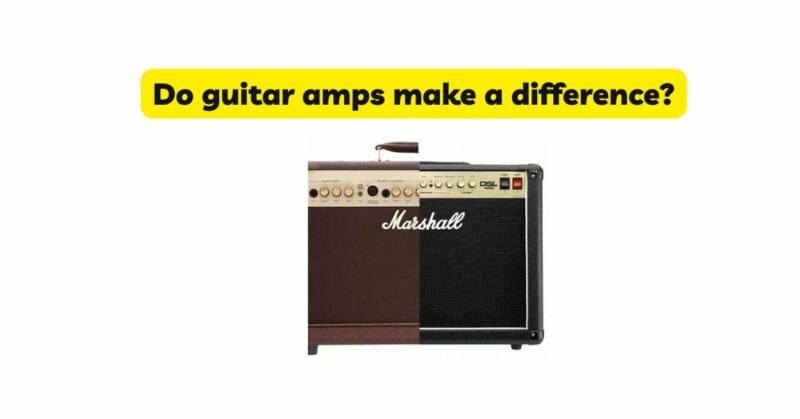When it comes to the world of electric guitars, the amplifier plays a crucial role in shaping the sound and tone. A guitar amp is more than just a device for amplifying the instrument—it is an essential tool that adds depth, character, and sonic possibilities. In this article, we will explore the ways in which guitar amps make a difference in sound and why they are vital for achieving the desired tone. Whether you’re a beginner guitarist or an experienced player, understanding the impact of guitar amps will help you unlock new levels of musical expression and creativity.
Tonal Sculpting and EQ Control: One of the primary ways in which guitar amps make a difference is through tonal sculpting and EQ control. A good amplifier offers a range of tone-shaping options such as bass, mid, and treble controls. These allow you to shape the frequencies and tailor the sound to your preferences. Whether you’re seeking a warm and mellow tone or a bright and cutting sound, the amp’s EQ controls enable you to fine-tune the sonic characteristics of your guitar. This level of control empowers you to create a personalized tone that suits your musical style and enhances your playing experience.
Amplification and Signal Processing: Guitar amps are designed to amplify the signal from your guitar, allowing it to be heard at an appropriate volume level. But amplification is not their sole purpose—amps also play a crucial role in signal processing. The components within an amp, such as tubes, transistors, or digital processors, shape the signal and add their own sonic characteristics. These components can introduce harmonically rich distortion, smooth compression, or dynamic effects like reverb or delay. The unique qualities of the amp’s signal processing contribute to the overall sound and define its distinctiveness.
Gain and Overdrive: Another significant aspect of guitar amps is their ability to generate gain and overdrive. Gain refers to the amplification of the guitar’s signal beyond its natural level, resulting in a distorted or saturated sound. Overdrive, on the other hand, refers to the gentle clipping of the waveform, producing a warm and gritty tone. Guitar amps offer different levels of gain and overdrive, allowing you to dial in the desired amount of saturation and distortion. This feature enables you to achieve anything from a clean, pristine sound to a full-on, crunchy rock tone.
Speaker Response and Cabinet Design: The speakers and cabinet design in a guitar amp also make a substantial difference in the overall sound. The speakers are responsible for translating the amplified signal into audible sound waves. Different speakers can have varying frequency responses, tonal characteristics, and power handling capabilities. Additionally, the cabinet design affects the dispersion and projection of the sound. The size, construction, and materials of the cabinet impact the resonance and overall tonal balance. Choosing the right combination of speakers and cabinet design allows you to shape the spatial qualities and tonal coloration of your sound.
Versatility and Flexibility: Guitar amps offer a level of versatility and flexibility that expands your sonic possibilities. They often provide multiple channels, each with its own distinct voicing and EQ settings. This allows you to switch between different sounds on the fly, ideal for live performances or studio recordings. Furthermore, many amps incorporate built-in effects such as reverb, delay, chorus, or modulation, eliminating the need for external pedals. This versatility allows you to experiment with different textures, add depth to your playing, and explore various genres and styles.
Live Performance and Projection: Guitar amps are essential for live performances, as they contribute to the projection and presence of your sound. A well-designed amp ensures that your guitar can be heard clearly in a live setting, even when competing with other instruments. The power and projection capabilities of an amp allow you to fill the room with your guitar’s sound, capturing the attention of the audience and creating an immersive musical experience. Whether you’re playing in a small venue or a large concert hall, a good amp ensures that your guitar’s voice is heard with clarity and impact.
Conclusion: Guitar amps undoubtedly make a significant difference in the sound and tone of an electric guitar. They offer tonal sculpting, EQ control, and signal processing capabilities that allow you to shape your sound to perfection. The ability to generate gain and overdrive opens up a world of sonic possibilities, from clean and pristine tones to gritty and saturated textures. Speaker response and cabinet design contribute to the overall tonal balance and spatial qualities of your sound. The versatility and flexibility of amps enable you to explore various genres and styles, while their importance in live performances cannot be overstated. In conclusion, guitar amps are not just amplifiers—they are essential tools that enhance your playing experience, unleash your creativity, and help you achieve the desired tone that defines your musical voice.


